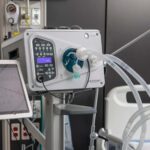A Canadian study found that 72% of patients with uncontrolled severe asthma were not on available biologic therapy, and 40% had four or more oral corticosteroid courses.
RT’s Three Key Takeaways:
- High OCS Overuse in Severe Asthma: A study of Canadian asthma patients found that 72% with uncontrolled severe asthma are not receiving biologic therapy, leading to significant oral corticosteroid overuse.
- Impact of Uncontrolled Severe Asthma: Patients with uncontrolled severe asthma face increased risks of short- and long-term adverse effects from oral corticosteroids, even at low doses, according to researchers.
- Need for Education on Treatment Options: Experts emphasize the importance of educating healthcare providers and patients on alternative treatments, such as biologics, to reduce corticosteroid dependency.
Data from a new real-world evidence study exposes oral corticosteroid overuse in Canadian patients with severe asthma.
The study, “Characterizing uncontrolled severe asthma in Canada (ALERT),” was presented at the American College of Chest Physicians Annual Meeting and the European Respiratory Society Congress. The study offers a better understanding of the use of oral corticosteroids by Canadians with uncontrolled severe asthma and highlights their unmet medical needs.
Uncontrolled severe asthma is a type of asthma that does not respond well to inhaled medicines alone and requires assessment by a specialist. In Canada, oral corticosteroids, along with inhaled medications, have been an important treatment option for managing severe asthma.
However, oral corticosteroids are known to increase the risk of short- and long-term adverse effects, even at low doses (equivalent to 1-2 courses). Other medicines, such as injectable biologics, can be used to treat uncontrolled severe asthma and have demonstrated oral corticosteroid-reducing effects.
Most Not on Biologic Therapy
The data from the ALERT study showed most people with uncontrolled severe asthma had substantial oral corticosteroid use but were not on available biologic therapy, highlighting a significant gap in the management of severe asthma. This emphasizes the need for better education of healthcare providers and improved patient awareness of treatment options.
The study was conducted by GSK in collaboration with Asthma Canada and with Susan Waserman, MD, McMaster University, and Andréanne Côté, MD, Quebec Heart and Lung Institute and Université Laval, with contract research support, input, and analytics provided by IQVIA Solutions Canada Inc.
“In an era with so many available treatment options for asthma, it is appalling to witness such a high rate of [oral corticosteroid] overuse. Better identification of uncontrolled patients and easier access to treatment optimization should be a top priority in the care of those patients,” says. Côté in a release.
Key findings of the ALERT study include:
- 7.5% of asthma patients were classified as having severe asthma.
- Of those with severe asthma, 12.7% were classified as uncontrolled severe asthma.
- 72% of patients with uncontrolled severe asthma were not on available biologic therapy.
- 40% of patients with uncontrolled severe asthma had four or more oral corticosteroid courses.
- Some regions in Canada have much higher oral corticosteroid use per person than other regions.
“Recognizing the alarming [oral corticosteroids] overuse is a step in the right direction to raise awareness among practitioners and patients of alternative treatment options for asthma management. Further education could enhance the adoption of these treatments to optimize outcomes,” says Waserman in a release.
Jeffrey Beach, president and CEO of Asthma Canada, adds in a release, “The findings of the ALERT study highlight the need to recognize [oral corticosteroids] overuse in Canada. It is fundamental to continue educating patients and healthcare practitioners about treatment options to protect people from [oral corticosteroids] overuse and optimize asthma management,”
An abstract of the ALERT study will be published in the European Respiratory Journal in November 2024.
ID 51873792 © Marsia16 | Dreamstime.com









